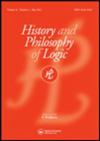黑格尔的自我预测逻辑
IF 0.5
3区 哲学
Q3 HISTORY & PHILOSOPHY OF SCIENCE
引用次数: 0
摘要
黑格尔的《概念论》提出了概念决定论。正如我将要证明的,黑格尔的概念决定论理论使他认可自我预言和存在暗示是概念意旨特有的特征。我首先演示这个逻辑的一些特征,以及它的一些蕴涵。在对黑格尔的自我谓词逻辑进行重构之后,我运用这一逻辑来阐明黑格尔对形式逻辑的批判。最后,黑格尔逻辑的自我谓词特征提供了一种衡量黑格尔逻辑的任何形式描述的潜力和局限性的标准。本文章由计算机程序翻译,如有差异,请以英文原文为准。
Hegel’s Logic of Self-Predication
ABSTRACT Hegel’s Doctrine of the Concept advances a theory of conceptual determinacy. As I will demonstrate, Hegel’s theory of conceptual determinacy leads him to endorse self-predication and existential implication as features endemic to conceptual content. I first demonstrate some features of this logic, and some of its entailments. Following the reconstruction of Hegel’s logic of self-predication, I apply this logic to illuminate Hegel’s critique of formal logic. Finally, the self-predicative feature of Hegel’s logics offers a measure by which to determine the potential and the limitations of any formal account of Hegel’s logic.
求助全文
通过发布文献求助,成功后即可免费获取论文全文。
去求助
来源期刊

History and Philosophy of Logic
综合性期刊-科学史与科学哲学
CiteScore
0.80
自引率
0.00%
发文量
24
审稿时长
>12 weeks
期刊介绍:
History and Philosophy of Logic contains articles, notes and book reviews dealing with the history and philosophy of logic. ’Logic’ is understood to be any volume of knowledge which was regarded as logic at the time in question. ’History’ refers back to ancient times and also to work in this century; however, the Editor will not accept articles, including review articles, on very recent work on a topic. ’Philosophy’ refers to broad and general questions: specialist articles which are now classed as ’philosophical logic’ will not be published.
The Editor will consider articles on the relationship between logic and other branches of knowledge, but the component of logic must be substantial. Topics with no temporal specification are to be interpreted both historically and philosophically. Each topic includes its own metalogic where appropriate.
 求助内容:
求助内容: 应助结果提醒方式:
应助结果提醒方式:


